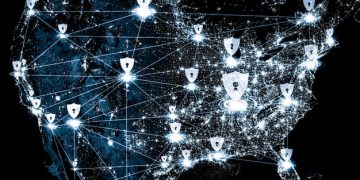Examining Foreign Influence on US Elections: Protecting Electoral Integrity

Examining the influence of foreign governments on US elections involves assessing threats, understanding tactics like disinformation campaigns and cyberattacks, and implementing measures such as sanctions, enhanced cybersecurity, and promoting media literacy to protect electoral integrity.
The integrity of US elections is a cornerstone of democracy, but it faces persistent threats from foreign governments seeking to undermine the process. Examining the influence of foreign governments on US Elections: What Measures Are Being Taken to Protect Electoral Integrity? is crucial to understanding and mitigating these risks.
Understanding the Landscape of Foreign Influence
Foreign interference in US elections is not a new phenomenon, but its methods and intensity have evolved significantly in recent years. Understanding the dynamics of these influences is essential to develop effective countermeasures.
Historical Context
Historically, foreign governments have attempted to influence US elections through various means, including propaganda and financial support to favored candidates. However, the digital age has introduced new avenues for interference.
Modern Tactics
Today, foreign actors employ sophisticated tactics such as disinformation campaigns on social media, cyberattacks targeting election infrastructure, and the exploitation of political divisions to sow discord and undermine public trust in the electoral process.
- Disinformation Campaigns: Spreading false or misleading information to influence public opinion.
- Cyberattacks: Targeting voter databases, electoral systems, and campaign communications.
- Financial Influence: Funneling money through shell corporations to support or oppose candidates.
The motivations behind these actions vary, ranging from promoting specific geopolitical interests to weakening democratic institutions and creating political instability within the United States.

Identifying Key Players and Their Motivations
Several foreign governments have been identified as active participants in attempts to influence US elections. Understanding their motivations and objectives is crucial for implementing targeted countermeasures.
Russia’s Role
Russia has been implicated in numerous attempts to interfere in US elections, particularly in 2016 and 2020. Their motivations often include undermining confidence in democratic processes and weakening the United States’ geopolitical standing.
China’s Influence
China’s influence efforts are often more subtle and long-term, focusing on shaping the political environment and promoting narratives favorable to their interests. This includes economic pressure and influence operations targeting political figures and institutions.
- Geopolitical Interests: Promoting a multipolar world and challenging US dominance.
- Economic Leverage: Using trade and investment as tools to influence policy decisions.
- Narrative Shaping: Disseminating propaganda through state-controlled media and social media platforms.
Other countries like Iran and North Korea have also engaged in disruptive activities, albeit to a lesser extent, driven by regional ambitions and a desire to counter US foreign policy objectives.
Legal and Regulatory Frameworks to Counter Foreign Influence
The US government has established legal and regulatory frameworks to counter foreign influence in elections. Examining these measures reveals their strengths and limitations.
The Foreign Agents Registration Act (FARA)
FARA requires individuals and organizations acting as agents of foreign principals to register with the Department of Justice and disclose their activities. This aims to increase transparency and prevent hidden influence operations.
Campaign Finance Laws
Campaign finance laws prohibit foreign nationals from making contributions or expenditures in US elections. However, enforcement can be challenging, and loopholes exist that allow foreign money to flow into political campaigns indirectly.
- Enforcement Challenges: Difficulty in identifying and prosecuting individuals and organizations involved in illicit activities.
- Loopholes in Regulations: Gaps in legislation that allow foreign money to enter the political system via soft money or through intermediaries.
- Need for Modernization: Updating FARA and campaign finance laws to address contemporary methods of foreign interference.
Reforms are needed to strengthen these laws and enhance enforcement capabilities. This includes increasing funding for investigative agencies and closing loopholes that allow foreign actors to circumvent regulations.

Technological Measures to Protect Electoral Systems
Technological solutions play a crucial role in protecting electoral systems from foreign interference. Investing in cybersecurity and developing resilient systems is essential to safeguard the integrity of elections.
Enhancing Cybersecurity
Protecting voter databases, voting machines, and campaign communications from cyberattacks requires robust cybersecurity measures. This includes implementing multi-factor authentication, conducting regular vulnerability assessments, and using encryption technologies.
Auditing and Monitoring
Regular audits and monitoring of electoral systems can help detect and prevent irregularities. This involves conducting post-election audits, tracking suspicious network activity, and using artificial intelligence to identify disinformation campaigns.
These measures require ongoing investment and collaboration between government agencies, technology companies, and election administrators. Sharing threat intelligence and best practices is crucial for staying ahead of evolving cyber threats.
The Role of Media Literacy and Public Awareness
Media literacy and public awareness are essential components of a comprehensive strategy to counter foreign influence. Educating the public about disinformation and manipulation tactics can empower citizens to make informed decisions.
Promoting Critical Thinking
Media literacy programs can teach individuals how to critically evaluate information, identify fake news, and recognize propaganda. This helps to build resilience against disinformation campaigns and promote informed civic engagement.
Supporting Independent Journalism
Independent journalism plays a vital role in fact-checking and exposing foreign interference efforts. Supporting journalism outlets and promoting media diversity can enhance the public’s access to reliable information.
- Community Engagement: Organizing workshops, seminars, and public service announcements to educate citizens.
- Educational Initiatives: Integrating media literacy into school curriculums to teach students critical thinking skills.
- Collaboration with Social Media Platforms: Working with social media companies to combat the spread of disinformation on their platforms.
By empowering citizens to become discerning consumers of information, societies can reduce the impact of foreign manipulation and strengthen democratic institutions.
International Cooperation and Diplomacy
International cooperation and diplomacy are necessary to address foreign interference in elections effectively. Working with allies and international organizations can help to expose and deter malign activities.
Sharing Intelligence
Sharing intelligence with allies can help to identify and track foreign actors involved in interference operations. This includes sharing information about cyber threats, disinformation campaigns, and financial flows.
Sanctions and Deterrence
Imposing sanctions on individuals and organizations involved in election interference can deter future activities. Diplomatic pressure and public condemnation can also help to hold foreign governments accountable for their actions.
These efforts require strong diplomatic relationships and a coordinated approach among like-minded countries. Establishing international norms and standards for election integrity can further strengthen global efforts to counter foreign influence.
Conclusion
Examining the influence of foreign governments on US elections reveals a complex and evolving threat landscape. By implementing comprehensive measures, including legal reforms, technological safeguards, media literacy, and international cooperation, the United States can enhance its resilience against foreign interference and protect the integrity of its democratic processes.
| Key Point | Brief Description |
|---|---|
| 🛡️ Legal Frameworks | FARA and campaign finance laws aim to counter foreign influence but need modernization. |
| 🌐 Tech Measures | Cybersecurity enhancements and auditing systems protect electoral systems. |
| 📚 Media Literacy | Educates the public to recognize and resist disinformation tactics. |
| 🤝 Intl. Cooperation | Sharing intelligence and imposing sanctions deter foreign interference. |
FAQ
▼
Foreign governments often use disinformation campaigns, cyberattacks, financial support, and propaganda to influence US elections. These tactics aim to sway public opinion and disrupt electoral processes.
▼
FARA requires individuals acting as agents of foreign principals to register with the Department of Justice, increasing transparency and preventing hidden influence operations by disclosing their activities.
▼
Cybersecurity measures include multi-factor authentication, regular vulnerability assessments, encryption technologies, and continuous monitoring to protect voter databases and campaign communications from cyberattacks.
▼
Media literacy teaches individuals how to critically evaluate information, identify fake news, and resist propaganda, empowering them to make informed decisions and reducing the impact of foreign manipulation efforts.
▼
Sharing intelligence with allies, imposing sanctions, and diplomatic pressure can help expose and deter foreign actors involved in interference operations, strengthening global efforts to protect election integrity.
Conclusion
In conclusion, safeguarding US elections from foreign influence requires a multifaceted approach. By strengthening legal frameworks, enhancing technological defenses, promoting media literacy, and fostering international cooperation, we can uphold the integrity of our democratic processes and protect against external manipulation.





